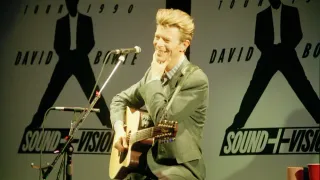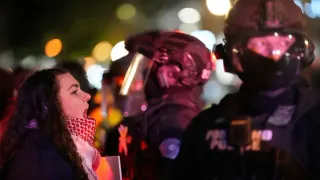November 14, 2014
Beyond the Lights
Jake Mulligan READ TIME: 3 MIN.
Gugu Mbatha-Raw stars in "Beyond the Lights" as Noni Jean, a grossly sexualized hip-hop star feeling deeply melancholic about the fact that her chest gets more attention than her sound. Noni has Adele's voice, but she's trapped in Nicki Minaj's marketing strategy.
We first meet her as a pre-teen belting out Nina Simone's "Blackbird" at a talent contest, then we jump forward a decade and change to see her featuring on tracks "authored" by Lil' Culprit (rapper Machine Gun Kelly, playing a particularly villainous spin on his own persona), trolloping around in his music videos wearing little more than strategically placed threads of fabric. Mom (Minnie Driver) cheers it all on, chalking it up to the costs of fame. It's not a massive shock when, about ten minutes into the movie, Noni tries to throw herself off the top of a building.
It's a good thing that Kaz, a police officer played in tandem by Nate Parker and Nate Parker's abs, was there to save her. He does so both physically (grabbing her by the wrist as she falls) and spiritually (looking deep into her eyes, and sensitively cooing "I see you"), which is your first sign that this is a paperback-romance-novel-as-movie. But director Gina-Prince Bythewood has some social commentary to impart before she gets around to the sex: Kaz wants to be a politician, and is as spurred on by Daddy (Danny Glover) as Noni is by Mommy. The twin plot lines thus establish politics (where Kaz has to vet and manipulate his every move, suppress his emotions, and lie endlessly) and entertainment (where Noni has to smuggle her lyrical talent in under the cover of tits and ass) as the twin lies of American life -- our favorite bullshit to indulge in swallowing.
We deconstruct said lies for awhile -- a botched awards show performance for Noni, a snafu with potential political backers for Kaz -- while the two leads begin a romance each other. But for the most part, "Beyond the Lights" swaps away from social commentary in its 2nd hour, diverting instead to Sirkian melodrama and steamy foreplay. (This is the kind of overwrought movie where a mother yells, "Don't you dare question my love for you" at her daughter, then follows it up with a vicious slap.) Once Kaz gets past his reservations about Noni's for-sale sexuality, the two run off, the movie morphing into another two-against-the-world tale. The social commentary dissipates, but never disappears: This is what Nicholas Sparks movies would look like if he had any interest in the culture surrounding his prototypical star-crossed lovers. There's another notable difference between this and Sparks, too: "Beyond the Lights" is sexy. If the squeals of audience members were a currency, than one of the film's set pieces -- an airplane-set, 'Yonce-scored sex scene -- would outgross "Avatar" all its own.
One thing Bythewood does get impeccably right is the imagery and language of the culture she's sending up. Give the set and production designers an award: Fake music videos, fake interviews meant to spin fake scandals, fake awards shows, fake press releases, fake tabloid headlines, fake Cleo covers... The details are all scary-accurate. Noni's dresses seemed stripped off Rihanna; the double-talk platitudes she uses to excuse her behavior seemed ripped out of a Bieber-camp press release. There's even a performative, publicity-boosting scuffle at the BET Awards. You come for the sex, but you stay for the texture: "Beyond the Lights" is so plugged into the milieu it's investigating that you can see the wires running off the screen.






